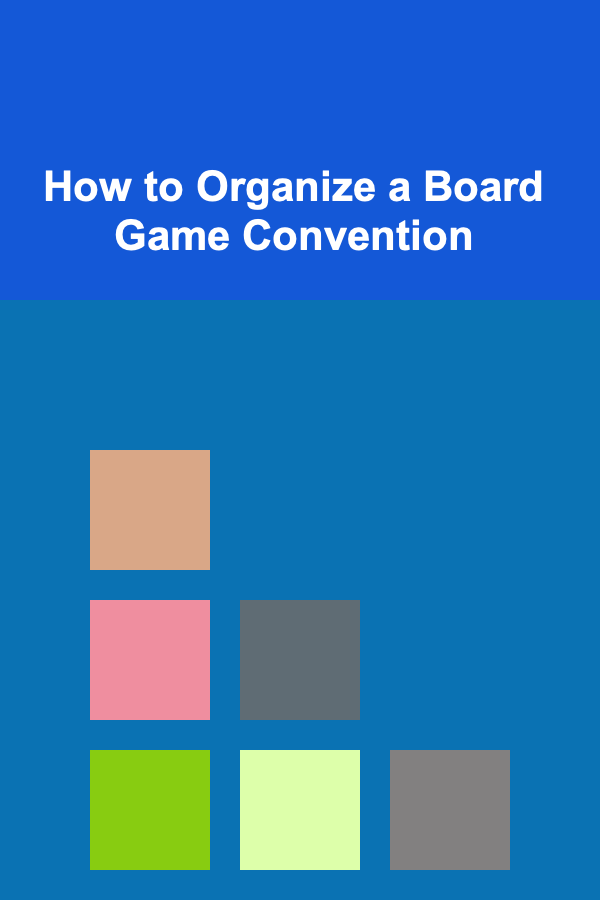
How to Organize a Board Game Convention
ebook include PDF & Audio bundle (Micro Guide)
$12.99$8.99
Limited Time Offer! Order within the next:

Board games have seen a tremendous resurgence in popularity in recent years. From traditional classics like Monopoly and Catan to new innovative games, enthusiasts and creators alike have fueled a thriving community. Organizing a board game convention provides an opportunity to bring together this passionate group of people, offering them a space to play, network, and explore new ideas. However, hosting a successful board game convention requires meticulous planning, attention to detail, and a deep understanding of your audience's needs.
In this guide, we will walk through the critical steps required to organize a memorable and well-executed board game convention, from the initial planning phase to post-event follow-ups.
Define the Purpose and Goals of the Convention
The first step in organizing any convention is understanding its core purpose. What do you want to achieve? This is a crucial question to ask yourself, as it will guide every decision you make along the way.
Here are some possible goals for your board game convention:
- Showcase New Releases: A space for game developers to debut new titles.
- Community Engagement: Bring board game enthusiasts together to connect, network, and share their experiences.
- Education: Host workshops or panels on topics like game design, strategy, or the history of board games.
- Competitions: Organize tournaments or competitions for popular games like Catan or Ticket to Ride.
- Retail Opportunities: Offer a marketplace for vendors to sell board games, merchandise, and related products.
Having a clear vision of your convention's purpose helps you focus on the needs of your attendees and ensures that all elements of the event align with your goals.
Budgeting and Funding
A board game convention can be a costly venture. Without a solid financial plan, you risk overspending and failing to cover all necessary expenses. Your budget will need to account for a variety of costs, including:
- Venue Rental: The cost of booking a location to hold the event.
- Marketing and Promotion: Advertising your convention to attract attendees, including digital campaigns, flyers, and event listings.
- Staffing Costs: If you're hiring event coordinators, volunteers, or contractors.
- Equipment and Supplies: Tables, chairs, A/V equipment, decorations, signage, and board games.
- Food and Beverages: Depending on the scale of your event, you may need to hire caterers or set up food stalls.
- Security and Insurance: Safety measures and liability coverage.
Funding Sources
When it comes to funding your event, you will need to explore several avenues:
- Ticket Sales: Offering tickets to attend the event, either with early-bird discounts or different pricing tiers for single-day or multi-day access.
- Sponsorships: Reach out to board game companies, publishers, or local businesses to sponsor different aspects of the event, such as tournaments or workshops.
- Crowdfunding: Websites like Kickstarter and GoFundMe can help you generate pre-event funding from potential attendees who are excited about your convention.
- Vendors: If you're offering space for vendors to sell products, you can charge them for a booth or table.
Creating a detailed budget and identifying possible sources of income ensures that you have the financial resources necessary to make the event successful.
Choose a Venue
The choice of venue is one of the most important factors in determining the success of your board game convention. The space needs to be large enough to accommodate attendees, vendors, and all the various activities that you plan to host.
Factors to Consider When Choosing a Venue
- Size and Layout: Ensure the venue has ample space for different zones, such as gaming areas, vendor booths, and event rooms. You should also plan for easy flow between areas.
- Accessibility: Choose a venue that's accessible to a diverse audience, including those with mobility issues. The location should also be convenient for public transportation and have nearby parking.
- Amenities: Does the venue offer restrooms, Wi-Fi, air conditioning, or heating? Will you need to arrange catering or food stalls? Think about what amenities will make attendees' experience more comfortable.
- Availability: Verify that the venue is available on the dates you plan to hold the event. Remember, some popular venues may require booking months in advance.
Popular options for board game conventions include convention centers, hotels with conference rooms, or large community halls. Once you select a venue, make sure to get contracts in writing, outlining the terms of your booking.
Plan the Event Schedule
Now that you have your goals, budget, and venue in place, it's time to create a detailed event schedule. This schedule should consider the flow of activities throughout the day(s), ensuring that attendees have a variety of things to do and no long periods of idle time.
Key Elements to Include in Your Schedule
- Game Play Areas: Set up open gaming spaces where people can drop in and play games. You could divide these areas by game type or complexity (e.g., family games, strategy games, party games).
- Tournaments: Organize competitive events for popular board games. You can host tournaments for classic games like Catan , Carcassonne , or Ticket to Ride. Ensure there are prizes for winners.
- Panels and Workshops: Arrange for workshops or panels on topics like game design, the business of board games, or advanced strategies for specific games.
- Networking Opportunities: Allow for time and space for attendees to network, share their experiences, and meet designers or publishers.
- Vendor Time: Schedule time for attendees to browse and purchase products from board game vendors, publishers, and other creators.
Consider creating a balance of events that are free-flowing and structured, as this ensures that both casual players and serious enthusiasts can enjoy the event in their own way.
Marketing and Promotion
Once your event plan is in place, it's time to start promoting the convention to ensure a good turnout. The success of your marketing efforts can make or break the event, so be sure to use a combination of online and offline strategies.
Digital Marketing Strategies
- Social Media: Platforms like Twitter, Facebook, Instagram, and TikTok are excellent for engaging with potential attendees. Use hashtags related to board games to expand your reach, and post sneak peeks of event details, guest speakers, and game previews.
- Event Websites and Email Newsletters: Create a website or landing page dedicated to the convention. This should include essential information, such as the event schedule, ticketing information, guest speakers, and special events. Regular email updates can keep your audience excited and informed.
- Influencers and Content Creators: Reach out to well-known board game influencers, streamers, or YouTubers to promote the event. If they agree to feature your convention in their content, you can expand your event's reach significantly.
- Crowdfunding Campaigns: Use a crowdfunding platform to build excitement for your convention. A well-run campaign can generate buzz and raise funds while also attracting backers who want to be a part of the experience.
Offline Marketing Strategies
- Posters and Flyers: Distribute physical promotional materials in local game shops, libraries, or cafes that board game enthusiasts frequent.
- Local Media: Contact local newspapers, radio stations, and TV stations to get coverage for the event. Many people still consume information this way.
- Partnerships: Collaborate with local businesses and board game stores to cross-promote the event. They can help distribute promotional materials and sell tickets.
Logistics and Staffing
As you near the date of the event, it's time to focus on logistics. This includes everything from setting up the venue to managing attendees during the convention.
Event Staffing
You'll need a team to help manage the event and ensure things run smoothly. Key roles include:
- Volunteers: Volunteers can assist with a range of tasks, such as checking in attendees, helping set up the gaming areas, and acting as guides during the event.
- Security: Hire security personnel to ensure that the event is safe and that attendees have a secure environment in which to enjoy the games.
- Tech Support: Ensure that there's someone on hand who can manage any technical issues, especially if you're using A/V equipment for presentations or live streaming.
- Game Masters: If you're hosting tournaments or guided events, game masters can help facilitate and organize the games.
Setup and Tear-Down
Make sure to plan your setup and tear-down times well in advance. The setup should include arranging the gaming tables, vendor booths, signage, and any other event materials. You'll also need to schedule enough time for cleaning and packing up after the convention ends.
Post-Event Follow-Up
Once the event concludes, your work isn't over. To ensure your convention is remembered fondly and to make improvements for the future, consider the following post-event strategies:
- Surveys and Feedback: Send out surveys to attendees to gather feedback on what went well and what could be improved.
- Thank You Notes: Send thank you emails to attendees, sponsors, and vendors for their participation. Consider offering discounts or early access to tickets for next year's event.
- Social Media: Share highlights, photos, and videos from the event. Tag guests, vendors, and sponsors to increase engagement.
- Evaluate Financial Performance: Assess whether the event met your financial goals, and identify areas where you can reduce costs or increase revenue in the future.
Conclusion
Organizing a board game convention is no small task, but it can be an incredibly rewarding experience. With careful planning, a clear understanding of your goals, and a focus on delivering a great experience for your attendees, your convention has the potential to become a staple event in the board game community. Whether you're bringing together fans of tabletop games for a weekend of fun, competition, and learning, or showcasing the latest in game design, your efforts will help build and strengthen a community that shares a love for gaming.
By following these steps, from defining your goals to handling the logistics and follow-up, you can create a memorable and impactful event that will leave attendees excited for the next one.
Other Products

10 Affordable Home Gym Setup Ideas for a Full-Body Workout
Read More
How to Find Affordable Furniture That Looks Expensive
Read More
How to Make a Job Interview Checklist for Preparing Your Resume and Cover Letter
Read More
How to Use Clear Containers to Keep Food Visible
Read More
How to Utilize Voice Cloning Software for Profit
Read More